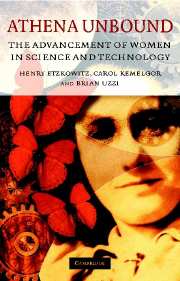Book contents
- Frontmatter
- Contents
- Acknowledgements
- Introduction: Women in science: Why so few?
- 1 The science career pipeline
- 2 Women and science: Athena Bound
- 3 Gender, sex and science
- 4 Selective access
- 5 Critical transitions in the graduate and post-graduate career path
- 6 Women's (and men's) graduate experience in science
- 7 The paradox of critical mass for women in science
- 8 The ‘kula ring’ of scientific success
- 9 Women's faculty experience
- 10 Dual male and female worlds of science
- 11 Differences between women in science
- 12 Social capital and faculty network relationships
- 13 Negative and positive departmental cultures
- 14 Initiatives for departmental change
- 15 International comparisons
- 16 Athena Unbound: Policy for women in science
- Appendix
- Bibliography
- Index
3 - Gender, sex and science
Published online by Cambridge University Press: 08 September 2009
- Frontmatter
- Contents
- Acknowledgements
- Introduction: Women in science: Why so few?
- 1 The science career pipeline
- 2 Women and science: Athena Bound
- 3 Gender, sex and science
- 4 Selective access
- 5 Critical transitions in the graduate and post-graduate career path
- 6 Women's (and men's) graduate experience in science
- 7 The paradox of critical mass for women in science
- 8 The ‘kula ring’ of scientific success
- 9 Women's faculty experience
- 10 Dual male and female worlds of science
- 11 Differences between women in science
- 12 Social capital and faculty network relationships
- 13 Negative and positive departmental cultures
- 14 Initiatives for departmental change
- 15 International comparisons
- 16 Athena Unbound: Policy for women in science
- Appendix
- Bibliography
- Index
Summary
The strong effect of culturally defined gender roles persists in science and other traditionally male professions through the social meanings attached to gender. Rather than a fluid perspective of human attributes that can be held by members of either sex, behavioral characteristics are frequently presumed to be innate and immutably ‘masculine’ or ‘feminine’ in the same way as one's biology.
The thesis that science is masculine, with ‘masculine’ understood as a cultural rather than as a biological term, ties issues of women in science to broader questions of gender roles and how they are culturally defined and transmitted from birth (Ruskai, 1990; Hyde, 1994). As Howell (private communication) points out, ‘Sex, which is concrete and universal, specifies no role whatsoever.’ Rather, it is cultural prescriptions and proscriptions, delineating which behaviors are appropriate to one sex and not the other, that creates the ‘psychological meaning’ of what it is to be male and female.
Thus gender as a concept was created to understand ‘the social quality of distinctions between the sexes … for the explicit purpose of creating a space in which socially mediated differences can be explored apart from biological differences’ (Hare-Mustin and Maracek, 1988). However, the concepts of sex and gender become easily entwined and socialization becomes confused with biology. Taking this a step further, ' … it would be illogical to say that being male or female would, in itself, make someone a good or bad scientist.
- Type
- Chapter
- Information
- Athena UnboundThe Advancement of Women in Science and Technology, pp. 31 - 48Publisher: Cambridge University PressPrint publication year: 2000



